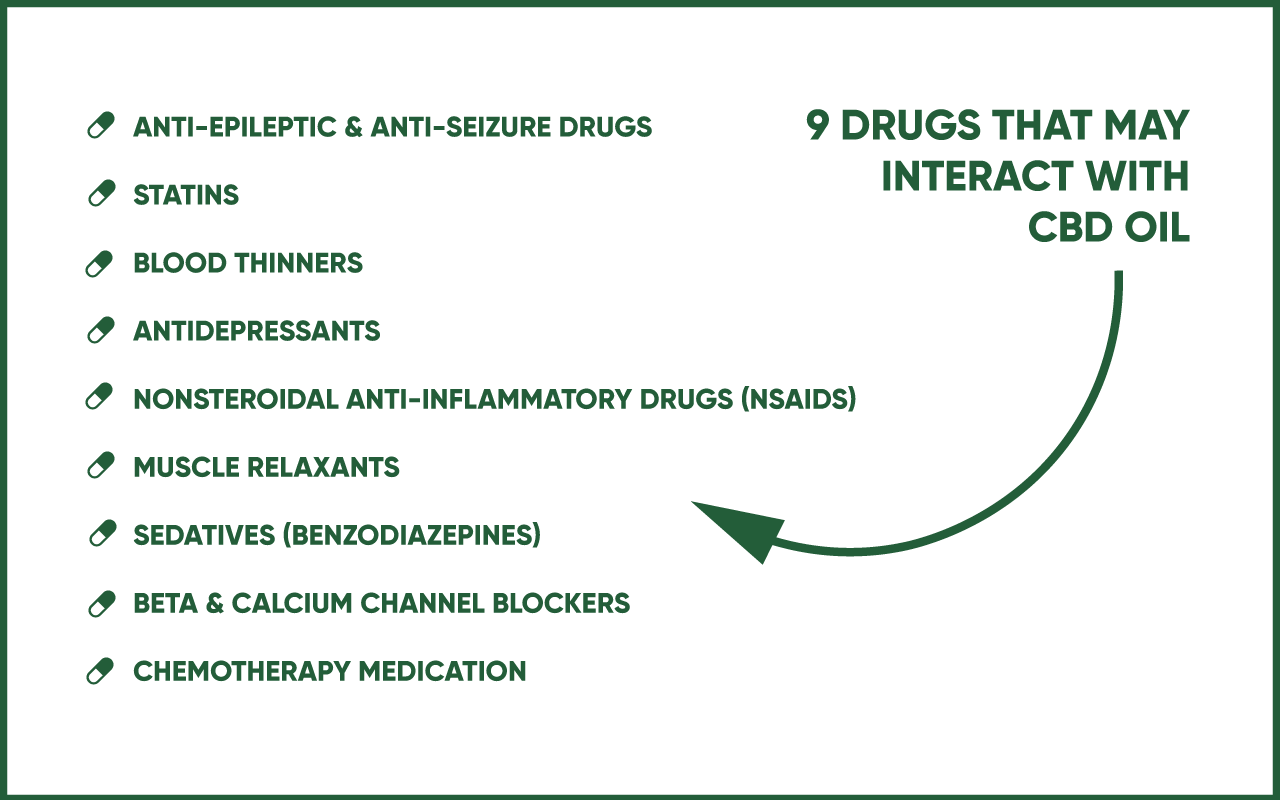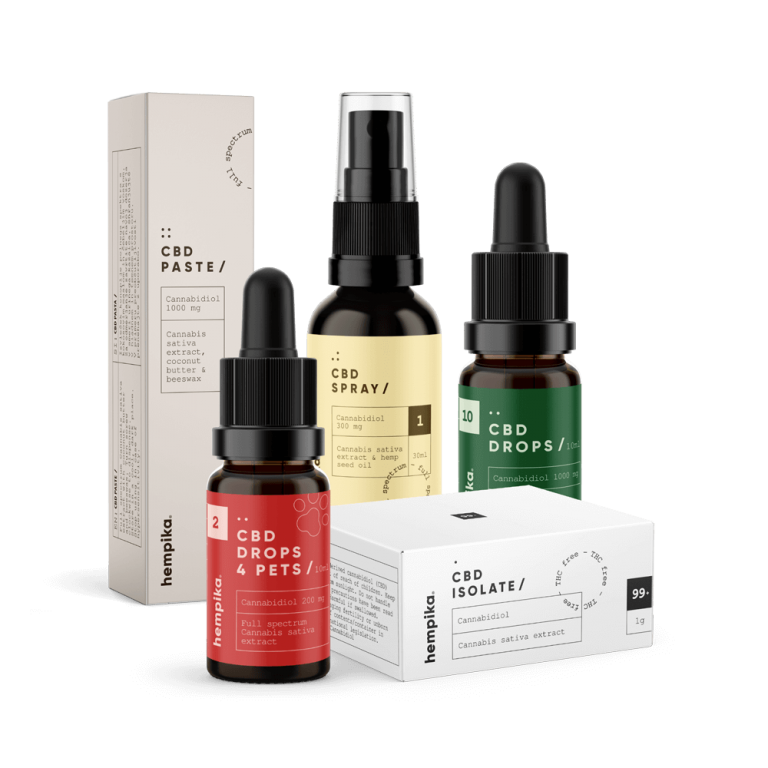As the CBD industry takes off and products hit the shelves worldwide, a new, more natural door to health and wellbeing has been opened.
While CBD can be used alongside many drugs without any adverse effects, our understanding of CBD and its drug interactions is still growing. What’s important is knowing the latest on which CBD drug interactions are safe, and which should be avoided.
If you’re currently on medication and considering CBD, or just curious, then keep reading to find out how you can safely use CBD products.
In this CBD blog we’ll be talking about how cannabidiol is metabolised, the role of Cytochromes and CYP enzymes, which medications interact with CBD, and why you should be careful mixing meds.
What is CBD?
Cannabidiol, also referred to as CBD, is one of at least 85 cannabinoids identified within the cannabis plant, and accounts for up to 40% of the plant’s extract.
Cannabinoids such as CBD bind to our body’s endocannabinoid system (ECS), in particular, the CB1 and CB2 receptors.
CBD has been shown to have analgesic, anticonvulsant, muscle relaxant, anxiolytic, neuroprotective, anti-oxidant, and anti-psychotic effects on the body.
The effects of CBD are commonly confused with THC, which is the psychoactive compound also found in these plants. Unlike THC, CBD does not create any ‘high’ sensation, though it still interacts to bring the benefits mentioned above, and more.
Check out the rest of our blog to delve a little deeper into these benefits, from how CBD can help athletes, to how CBD can help anxiety.
What are Cytochromes P450 and CYP enzymes?
First, some stuff around the science so you can understand CBD drug interactions even better.
Cytochrome P450, often shortened to CYP, is a family of enzymes that metabolise certain medication and compounds in the liver, CBD included.
They are responsible for how our bodies interact with many drugs, and CBD can both speed up or slow down this metabolic process.
There are over 50 of them, but just six metabolise 90 percent of drugs, with CYP3A4 and CYP2D6 being the most significant of these enzymes.
Depending on how the enzymes interact with drugs and natural compounds, the reaction can result in possible drug toxicities, reduced pharmacological effects, and generally unanticipated adverse drug-drug reactions.
How is CBD metabolised?
CBD is metabolised in the liver by multiple cytochrome P450 isoenzymes to form metabolites which are stored for up to four weeks in fatty tissue, and released at sub-therapeutic levels back into the bloodstream.
It is metabolised via the renal and biliary systems, and the process depends on dose, route of administration, and bioavailability.
What is bioavailability?
In short, bioavailability refers to the speed and proportion a substance is absorbed by the body to reach the body’s circulation.
What are the stages of metabolism?
Stage 1 metabolism involves chemical reactions such as oxidation, reduction, and hydrolysis.
Stage 2 metabolism involves reactions that chemically change the drug or phase 1 metabolites into compounds that are soluble enough to be excreted in urine.
The following three methods are the main ways CBD is absorbed into the body:
1. Oral:
With oral ingestion, such as with edibles and capsules, CBD is absorbed through the digestive system and stomach, ending up in the liver where it forms metabolites.
It goes through stage 1 metabolism, and the remainder passes into the bloodstream. It has a low bioavailability rate of around 13-19%.
2. Inhalation:
Absorbed through the lungs as vapour through CBD vape oils, bypassing the first-pass metabolism it immediately enters the bloodstream. A higher bioavailability is estimated at 31%, with quick onset.
3. Sublingual:
CBD oil follows the sublingual route, entering the bloodstream through blood vessels under the tongue where the CBD must be help for one minute. This bypasses both digestive and first-pass metabolism, with a bioavailability of up to 35%, but generally around 18%.
Why is it important to be careful?
Why is it important to be careful with CBD drug interactions? From prescription medication to grapefruit, it’s crucial to understand how CBD products interact with other substances in our bodies.
Increased & decreased drug effects
CYP enzymes and substrates can either act as inhibitors or inducers when reacting with other drugs. Inhibitors and substrates increase the effectiveness of drugs metabolised by that enzyme, while inducers decrease effectiveness.
So, an overactive CYP enzyme will make a drug ineffective. This means the patient will experience no benefit from taking that medication as it’s broken down too quickly.
But, if these enzymes are not active enough, decreased effectiveness can lead to the drug staying in the body for a prolonged duration and causing toxicity.
Side effects
Also, when taking CBD with prescription medication, or even over-the-counter meds and natural remedies, the side effects of that substance can become even more severe.
For example, increased sleepiness when CBD is taken with antidepressants or opioids. With stimulants such as Adderall, this can also lead to a reduced appetite, so be sure to check out the details yourself and ask a doctor.
It’s key to understand the interactions of CBD with these medications and other drugs as best as possible. Doing this reduces the risk of adverse effects and controls the amount of risk involved.
Inhibitors, inducers, and substrates of Cytochrome P450 enzymes
These isoenzymes do not all interact equally, with inducers, substrates, and inhibitors varying in type from strong to weak. This depends on the active concentration of the compound and the therapeutic index of the drug.
A drug interaction will likely have serious clinical consequences when there is a smaller difference between the toxic and effective concentration.
They can also be naturally present in things we consume, grapefruit being a prime example. The FDA has a warning for grapefruit, as it interacts with many drugs to change their concentration, usually inhibiting the enzymes.
This can be used as a rule of thumb, so if taking CBD products, avoid any meds that have the grapefruit warning just to be safe and avoid a CBD oil grapefruit interaction.
As with many aspects of CBD, a great deal of further research is needed as the information on CBD drug interactions can be conflicting. For this reason, it’s always better to play it safe unless you’re sure.
Does CBD affect medications?
In terms of CBD drug interactions, the cannabinoid seems to have an inhibitory effect on these enzymes when other compounds are present. From CBD oil to gummies, the presence of cannabidiol can limit the metabolism of certain substances.
This effect varies by dosage, your individual biochemistry, and your chosen method to absorb CBD as mentioned above. So, if you’re worried about CBD interactions with medications, it’s critical you consult your doctor first.
In more detail, cannabidiol acts as a Cytochrome P450 2C8 Inhibitor, Cytochrome P450 2C9 Inhibitor, Cytochrome P450 2C19 Inhibitor, UGT1A9 Inhibitor, UGT2B7 Inhibitor, Cytochrome P450 1A2 Inhibitor, Cytochrome P450 2B6 Inhibitor, and Cytochrome P450 2B6 Inducer.
List of known medications/drugs that interact with CBD
CBD interactions with medications and other natural compounds such as grapefruit are continually being tested.
Researchers have found 139 medications that can be affected by cannabinoids, with 57 of these causing possibly dangerous concentration changes.
Can you take CBD with thyroid medicine? If you take levothyroxine, a common thyroid medication, researchers identified potentially serious drug interactions.
Does CBD affect heart medication? CBD interactions with heart medication are another you need to be extremely careful with, as the heart rhythm medication amiodarone was found to be affected by CBD.
There are also CBD interactions with several seizure medications, notably clobazam, lamotrigine, and valproate.
Another potentially serious interaction with CBD is with the common blood pressure drug warfarin.
In general, the top 9 drugs found to interact with CBD are:
- Anti-epileptic and anti-seizure drugs
- Statins
- Blood thinners
- Antidepressants
- Nonsteroidal anti-inflammatory drugs (NSAIDs)
- Muscle relaxants
- Sedatives (benzodiazepines)
- Beta and calcium channel blockers
- Chemotherapy medication

While the above outlines some of the major CBD drug interactions, the following table gives a larger list of different CYP isoenzymes, showing their inhibitors, inducers, and substrates:
CYP1A2:
| INHIBITORS | INDUCERS | SUBSTRATES |
|---|---|---|
| cimetidine | barbiturates | amitriptyline |
| ciproflxacin | carbamazepine | caffeine |
| enoxacin | charcoal-broiled foods | clomipramine |
| erythromycin | lansoprazole | clozapine |
| ***fluvoxamine | omeprazole | cyclobenzaprine |
| grepafloxacin | phenytoin | grepafloxacin |
| isoniazid | rifampin | imipramine |
| mexiletine | smoking | Mirtazapine |
| norfloxacin | olanzapine | |
| tacrine | propranolol | |
| zileuton | riluzole | |
| ropinirole | ||
| R-warfarin | ||
| tacrine | ||
| theophylline | ||
| zileuton |
CYP2C9:
| INHIBITORS | INDUCERS | SUBSTRATES |
|---|---|---|
| amiodarone | barbiturates | carvedilol |
| cimetidine | carbamazepine | celecoxib |
| cortrimoxazole | rifampin | diclofenac |
| fluconazole | rifapentine | flurbiprofen |
| ***fluvoxamine | St. John’s wort | fluvastatin |
| isoniazid | glimepiride | |
| ketoconazole | ibuprofen | |
| metronidazole | irbesartan | |
| Zafirlukast | Losartan | |
| montelukast | ||
| naproxen | ||
| phenytoin | ||
| piroxicam | ||
| tolbutamide | ||
| torsemide | ||
| S-warfarin | ||
| zafirlukast |
CYP2C19:
| INHIBITORS | INDUCERS | SUBSTRATES |
|---|---|---|
| felbamate | None | amitriptyline |
| fluoxetine | citalopram | |
| fluvoxamine | clomipramine | |
| modafinil | diazepam | |
| omeprazole | Imipramine | |
| Oxcarbazepine | lansoprazole | |
| phenytoin | ||
| omeprazole | ||
| R-warfarin | ||
| montelukast | ||
| naproxen | ||
| phenytoin | ||
| piroxicam | ||
| tolbutamide | ||
| torsemide | ||
| S-warfarin | ||
| zafirlukast |
CYP2D6:
| INHIBITORS | INDUCERS | SUBSTRATES |
|---|---|---|
| amiodarone | None | amitriptyline |
| chloroquine | carvedilol | |
| cimetidine | chlorpromazine | |
| clomipramine | clomipramine | |
| diphenhydramine | clozapine | |
| fluoxetine | codeine | |
| fluphenazine | desipramine | |
| haloperidol | dextromethorphan | |
| paroxetine | dihydrocodeine | |
| perphenazine | donepezil | |
| propafenone | flecainide | |
| propoxyphene | fluoxetine | |
| quinacrine | haloperidol | |
| quinidine | hydrocodone | |
| ritonavir | imipramine | |
| sertaline | loratadine | |
| terbinafine | maprotiline | |
| thioridazine | Methamphetamine | |
| metoprolol | ||
| mexiletine | ||
| mirtazpine | ||
| nortriptyline | ||
| oxycodone | ||
| paroxetine | ||
| perphenazine | ||
| propafenone | ||
| propanolol | ||
| risperidone | ||
| ritonavir | ||
| thoridazine | ||
| timolo | ||
| tolterodine | ||
| tramadol | ||
| trazodone | ||
| venlafaxine |
CYP3A4:
| INHIBITORS | INDUCERS | SUBSTRATES |
|---|---|---|
| amiodarone | barbiturates | alfentanil |
| amprenavir | carbamazepine | alprazolam |
| clarithromycin | dexamethasone | amiodipine |
| cyclosporine | efavirenz | amprenavir |
| danazol | ethosuximide | atorvastatin |
| delavirdine | griseofulvin | bepridil |
| diltazem | modafinil | buspirone |
| efavirenz | nafcillin | carbamazepine |
| erythromycin | nevirapine | cerivastatin |
| ethinylestradiol | oxcarbazepine | cisapride |
| fluconazole | phenytoin | citalopram |
| fluvoxamine | primidone | clarithromycin |
| grapefruit juice | rifabutin | clomipramine |
| indinavir | ***rifampin | corticosteroids |
| itraconazole | rifapentine | cyclophosphamide |
| ketoconazole | St. John’s wort | cyclosporine |
| nefazodone | dapsone | |
| nelfinavir | delavirdine | |
| quinine | diazepam | |
| ***ritonavir | diltiazem | |
| saquinavir | disopyramide | |
| Synercid | dofetilide | |
| troleandomycin | donepezil | |
| verapamil | doxorubicin | |
| zafirlukast | efavirenz | |
| erythromycin | ||
| ethinylestradiol | ||
| etoposide | ||
| felodipine | ||
| fentanyl | ||
| finasteride | ||
| ifosfamide | ||
| imipramine | ||
| indinavir | ||
| isradipine | ||
| itraconazole | ||
| ketoconazole | ||
| lansoprazole | ||
| loratadine | ||
| Losartan | ||
| lovastatin | ||
| methadone | ||
| midazolam | ||
| mirtazapine | ||
| montelukast | ||
| nefazodone | ||
| nelfinavir | ||
| nicardipine | ||
| nifedipine | ||
| nimodipine | ||
| nisoldipine | ||
| paclitaxel | ||
| pimozide | ||
| quetiapine | ||
| quinidine | ||
| quinine | ||
| repaglinide | ||
| refabutin | ||
| ritonavir | ||
| saquinavir | ||
| sertraline | ||
| sibutamine | ||
| sildenafil | ||
| simvastatin | ||
| sirolimus | ||
| sufentanil | ||
| tacrolimus | ||
| tamoxifen | ||
| testosterone | ||
| tolterodine | ||
| toremifene | ||
| triazolam | ||
| troleandomycin | ||
| verapamil | ||
| vinblastine | ||
| vincristine | ||
| R-warfarin | ||
| zaleplon | ||
| zileuton | ||
| zolpidem | ||
| zonisamide |
Summary/Conclusion
In summary, to fully understand CBD drug interactions a load more research needs to be done.
Even though that scientists confirmed that small amounts of CBD are safe to use and shouldn’t interact with medications, it is always recommended to take some precautions. So, if you’re worried about the interactions of CBD with your medications, or any other substance, don’t hesitate to consult a doctor first.
Even so, from current research, it’s clear to see there are some things that should be avoided, or at least double-checked before you take CBD. From antidepressants to sedatives, interactions can increase or decrease drug effectiveness.
Not only this, but CBD might also add to the side effects already present, so watch out and make sure you do the research and talk to the professionals.
FAQ:
Does CBD interfere with medication?
CBD does interfere with some medication, and this is because of how it reacts with Cytochromes and CYP isoenzymes. This varies depending on the drug and CBD dose, so it’s best to ask a doctor and search the specifics for yourself.
Can I take Ibuprofen with CBD?
If you’re wondering “can I take Ibuprofen with CBD”, to be safe the answer is no. There is still more research needed on this, but CBD can interact with the enzymes that metabolise Ibuprofen and influence its effects.
Does CBD interact with NSAIDs?
Though not with all painkillers, CBD does react with some nonsteroidal anti-inflammatory drugs (NSAIDs) as they are processed by enzymes in the liver, where CBD is also active.
Does CBD oil have any interactions with medications?
CBD oil does have interactions with some medications, like any CBD product. However, CBD oil can, in particular, interact more than other products as it often has increased bioavailability, meaning a higher active dose in the body.
Does CBD oil interact with grapefruit?
Like many compounds, CBD oil does interact with grapefruit. This is because grapefruit, and some other citrus fruits, can slow down the metabolic pathways used by drugs in similar ways as CBD. So, you should avoid mixing them.
Does CBD interact with Ibuprofen?
CBD does interact with Ibuprofen as it increases the amount of time the drug stays in the body. This can increase the already present bleeding risk posed by ibuprofen.
Can CBD replace seizure medication?
There are examples where CBD can replace prescriptions, but for seizure medication, this is not advised. CBD can have strong drug interactions with these medications, in particular clobazam, lamotrigine, and valproate.
Author:T. F.
Sources:
https://puregreenliving.com/how-is-cbd-metabolized
https://cbdnhemp.com/cbd/faq/how-is-cbd-metabolized-in-our-body/
https://www.aafp.org/afp/2007/0801/p391.html
https://www.ncbi.nlm.nih.gov/pmc/articles/PMC1312247/
https://www.d.umn.edu/~jfitzake/Lectures/DMED/TAA/Q_A/CYP450InteractionTable.htm
https://drug-interactions.medicine.iu.edu/MainTable.aspx
https://en.wikipedia.org/wiki/List_of_cytochrome_P450_modulators
https://link.springer.com/article/10.1007/s11419-019-00467-0
https://go.drugbank.com/drugs/DB09061
https://www.drugs.com/drug-interactions/cannabidiol.html
https://www.health.harvard.edu/blog/cbd-and-other-medications-proceed-with-caution-2021011121743
https://www.ncbi.nlm.nih.gov/pmc/articles/PMC5576600/
https://www.news-medical.net/life-sciences/What-are-Cytochrome-P450-(CYP)-Enzymes.aspx
https://www.sciencedirect.com/topics/chemistry/p450-inhibitor
https://www.sciencedirect.com/topics/medicine-and-dentistry/bioavailability
https://pubmed.ncbi.nlm.nih.gov/9839089/
https://pubchem.ncbi.nlm.nih.gov/compound/cannabidiol#section=FDA-Pharmacological-Classification
https://www.stem.org.uk/system/files/elibrary-resources/legacy_files_migrated/33419-RSCPharmacokineticprocessesmetabolism.pdf
https://cbdeducationonline.com/cbd-and-ibuprofen/
https://loudcloudhealth.com/resources/cbd-drug-interactions/
https://www.healthline.com/health/cbd-and-drug-interactions-what-you-need-to-know#interactions
https://www.fda.gov/consumers/consumer-updates/grapefruit-juice-and-some-drugs-dont-mix


